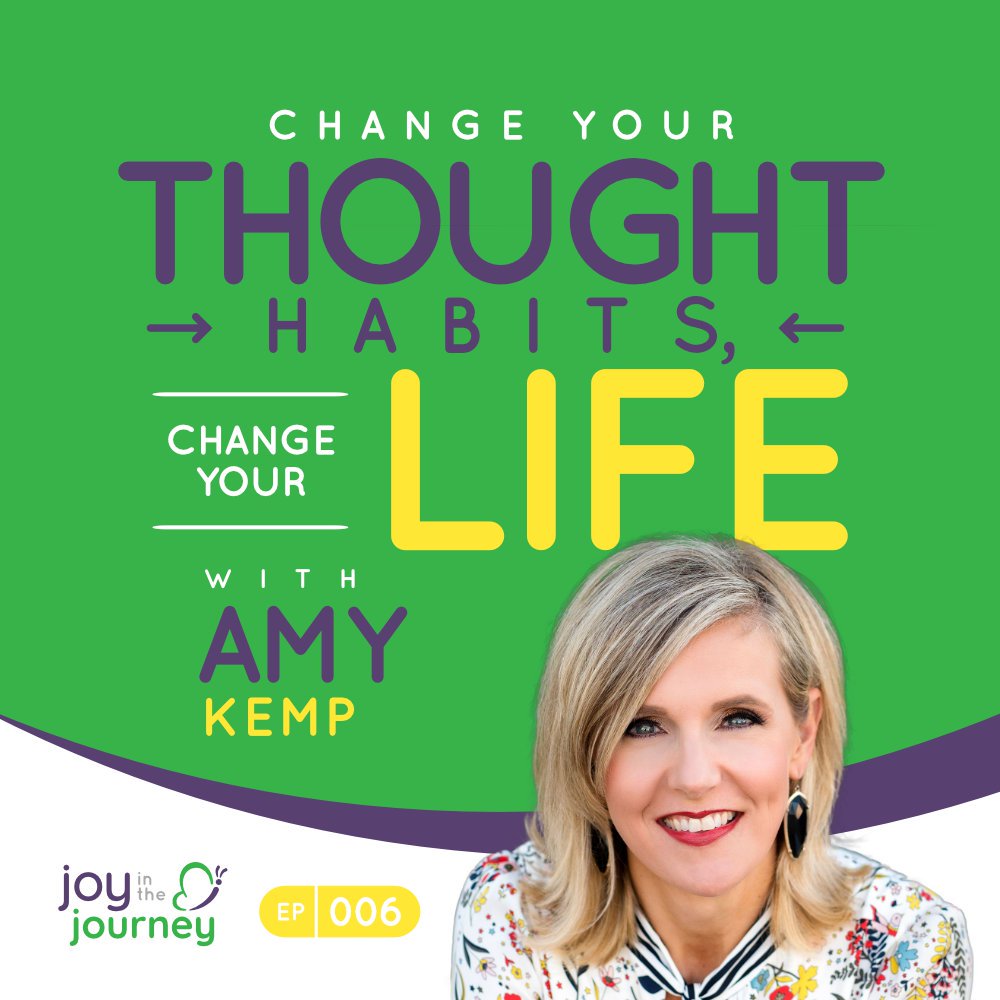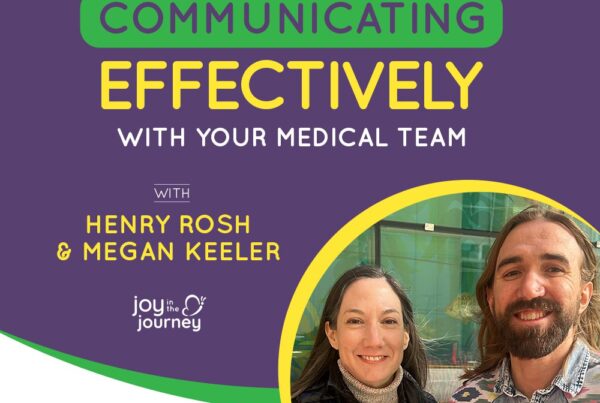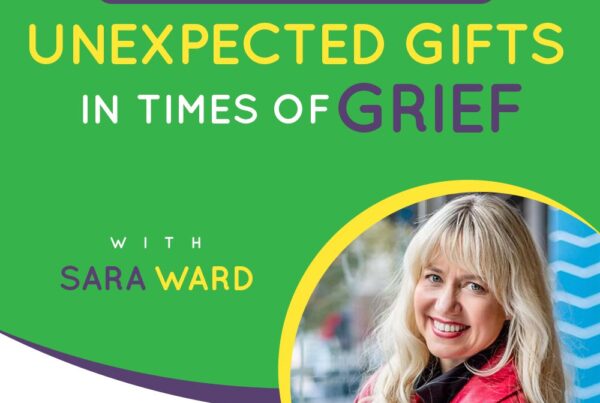
Sometimes when you can’t control the circumstances life gives you, you try controlling everything else—something I know I’ve done as a mother.
Today’s guest, Amy Kemp, is talking about how sometimes you need to make space for others to do things for you, especially when you’re dealing with difficult moments in life.
Amy is a public speaker, and the owner and CEO of Amy Kemp Inc., where she helps leaders and business professionals understand how deeply thought habits impact every part of work and life. She’s a certified Habit Finder Coach, and she’s helped over 200 female entrepreneurs through their leadership development journey.
Amy is showing us how we can get through challenges by teaching ourselves a different way of thinking. She shares the dangers that come with expectations and assumptions, and dives into the tools you need to help ground yourself in the moment.
She also shares healthier coping mechanisms for life’s struggles, how to articulate your needs, and most importantly how to allow space for other people to help you on your journey.
If you want to learn new thinking habits and how to be present in your current circumstances, don’t miss my conversation with Amy Kemp!
Key Takeaways with Amy Kemp
- How can emotional attachment amp up any challenge?
- Catastrophic vs. Fantasy thinking.
- How do you deal with expectations and assumptions?
- What fight or flight has to do with hurtful expectations.
- Tools you can use to get through life’s challenges.
- Learn how to bounce your concerns off of the people you surround yourself with.
- How to bring yourself back to the present moment and ground yourself.
- How moving your body and listening to music can help you get out of flight or fight moments.
- Feeling a loss of control and how that can affect you mentally and physically.
- Why do our brains need to draw conclusions, and what happens if they can’t?
- Grounding everyday tasks that help you get through hardship.
- Destructive escapism and figuring out healthier coping mechanisms.
- Learning to delegate things and articulating your needs.
- The power of systems and checklists!
- Allowing space for people to help you.
- How to advocate for your kids when what they need is beyond your scope.
- How difficult circumstances can lead to positive outcomes.
Amy Kemp Tweetables
- “Thoughts impact every moment of every day of our lives. If we can replace unhealthy thought habits with more healthy ones, it not only affects our work but it affects our families, our homes, our communities. It affects every part of our lives.” – Amy Kemp
- “Sometimes it’s hard to let yourself be held.” – Amy Kemp
- “When you hold space for people that are difficult to hold space for, you need to make sure someone else is holding space for you. You need to let people do things for you.” – Amy Kemp
- “Keep yourself in the feelings and in the moment and in the present, as painful as it is, it can be a real turning point or refining moment for you personally.” – Amy Kemp
Resources
- Amy Kemp’s Website
- Amy Kemp on Facebook and Instagram,
- Amy Kemp’s Resources and Courses
- How to Stop Worrying and Start Living
Rate & Review
If you enjoyed today’s episode of The Joy In The Journey, hit the subscribe button on Apple Podcasts, Spotify, Stitcher, Castbox, Google Podcasts, iHeart Radio, or wherever you listen, so future episodes are automatically downloaded directly to your device.
You can also help by providing an honest rating & review over on Apple Podcasts. Reviews go a long way in helping us build awareness so that we can impact even more people. THANK YOU!
Transcript
[INTRODUCTION]Jamie Freedlund: I’m so excited for my conversation today with Amy Kemp. Amy is the owner and CEO of Amy Kemp Inc, and she helps leaders and business professionals understand how deeply thought habits impact every part of work and lives. And you’re really in for a treat. She has the credentials of working with business leaders. She’s led over 200 female business leaders through four-month leadership development and counter sessions, and she’s also worked through Habit Finder curriculum and with hundreds of leaders in one-on-one settings and leadership teams at small and large companies. Some of you might be thinking, “How is this applicable to me?” And I just have to tell you it is. Her work with thought habits can be applicable to any part of life, and she just happens to have the niche of being a strategic coach and a business owner, and she brings us to the business community in a really beautiful way but she has some wonderful thoughts that we’re going to have in our conversation today that I know you can apply right now in your circumstance. Amy does extensive public speaking engagements on various topics and her audience walk away feeling understood and affirmed, and also challenged to become more. Thanks, Amy, for being with us today.
[INTERVIEW]Jamie Freedlund: Well, hi. Welcome, Amy Kemp, to the podcast.
Amy Kemp: Thanks, Jamie. Welcome. So, glad to be here.
Jamie Freedlund: We’re glad to have you. As you heard in the intro, Amy’s wheelhouse really is business leadership but I invited her to this podcast because she has a valuable message that’s very relevant for our listeners. And I have had the pleasure of learning from Amy, and I wish that a lot of the tools that I learned while working with her is something that I knew during the navigating of Mattea’s journey. So, I’m so just thrilled and it’s going to be a treat for all of you listening to hear some of the tools and takeaways that Amy has to share with you today. So, we’re inviting listeners, Amy, to come along with us to discuss finding joy in the journey. So, thanks for bringing your expertise to the show, and our intention is that others are going to learn and be inspired and bring more joy to their journey as they hear it. So, to start off with how would you best describe the work that you do?
Amy Kemp: Great question. I am a certified Habit Finder coach, so I use a specific assessment tool called Habit Finder Assessment that basically takes a picture of the pathways your brain is traveling at this moment in time, kind of your default when you’re not thinking about it and not intentional, where does your brain naturally go? And the work is really inspiring because we aren’t our thoughts. They’re just things. Thoughts are just things but thoughts impact every moment of every day of our lives. And so, if we can replace unhealthy thought habits with more healthy ones, it not only affects our work but it affects our families, our homes, our communities. It affects every part of our lives. So, I really am working primarily with female leaders to help them in that journey of replacing those unhealthy thought habits with better ones.
Jamie Freedlund: That’s a really great way to say it, and I’m sure you’ve had clients who are navigating life’s unexpected challenges in different realms of their life. When you think about a parent who’s in the thick of a challenge with their child, what tools or practices, or just some basic things around their thoughts would you encourage them to put into practice?
Amy Kemp: I thought long and hard about this because while there are similarities between any of life’s challenges, it amps up the emotional attachment piece a lot when it’s your child and it’s so close to your heart. I think one of the thoughts that really affects people when they’re in a moment of great challenge is that our brains can tend to go in one of two directions. They can move toward catastrophe where maybe the tone of voice of a doctor or an off-handed comment of a family member or something that you see in your child sends you in 0.2 seconds to the worst possible scenario and you’re making up a story of catastrophe that may or may not be true in that moment but your brain just goes there really quickly. Probably the funny example of this, which I love to give people is I have this very vivacious, energetic child who’s now 10, and he tends to jump and then think, “Was that a good idea that I just jumped?” And so, I walked outside one day in the summer. We have a trampoline in the back. He’s on the trampoline. He’s got this, the garden hose pulled all the way out there, and he’s got about six or seven other little boys around him. And they’re all chanting like, “Yeah, yeah, yeah, yeah,” like chanting. And he’s got the hose and he sort of like leaning back like a rock star, like spraying it in his mouth like he is on stage in front of 20,000 people, right?
And immediately, my brain goes to the worst-case scenario of he’s in college. He’s at a frat party on a table with a keg of beer, and he has alcohol poisoning and I’m getting called to go to the hospital. I mean, he’s 10 like he’s so far from even going to college but I will jump quickly because my brain very quickly can play things out into the future that may or may not even be true. So, funny example, but I think it illustrates what I’m saying with the catastrophe. Conversely, your brain can go to fantasy, which is kind of attaching happiness to a time somewhere out in the future that isn’t here yet that you are creating in your mind as the place where there won’t be any stress anymore. There won’t be any more challenges. There won’t be any annoying people. There won’t be any need for boundaries because everyone will treat you kindly. And you create this world in your head and you get very emotionally attached to it. So, perhaps, I’m thinking of an example that might be like you’re waiting on a test result. That’s particularly important and stressful, and you’re creating in your mind a fantasy scenario that once we know that result, we’re going to be completely happy. And you get attached to what you think that result is going to be and then if anything threatens it or when it turns out differently than that, the crash is worse because it’s not just the bad news or the unexpected result, it’s also the crash of your expectation and your attachment to what you thought was going to happen.
So, you’re taking a really difficult thing as it is. So, if I could describe it like climbing a mountain, right, that what you’re doing and caring for a child who isn’t well is already super difficult and you’re adding. It’s like you’re putting on a 100-pound backpack of expectations and getting really attached to those expectations, which then makes the journey even harder than it would be on its own.
Jamie Freedlund: Absolutely. It’s incredible how powerful our brain is that it can go to either of those places. And as you describe them, I could visualize myself even while I was in the hospital with Mattea doing both of those things in different ways. And it’s really easy to slip into it even. So, would you have some advice of how do you neutralize and come back in the middle and sort of also give them permission to say no if your brain goes to catastrophe, “Don’t beat yourself up,” or if it goes to this future, “Oh, well, when we’re home or when we’re discharged, I’m going to be okay?” That’s okay if your brain goes there for a minute but how do you sort of encourage them to bring it back to the middle?
Amy Kemp: Right. Well, okay, before I answer that, let me also say that if you do go in either direction and then experience that crash, what happens inside of your body is also sort of dangerous to your personal health in terms of its fight or flight, it’s full-on fight or flight. So, when you are attached to an expectation and then something shows up differently, maybe even something happens before you get the result that threatens the result or you can’t get the test on time or, you know, whatever it is that threatens the expectation that you are attached to, your body goes into full flight or fight mode. So, all of the adrenaline. There’s a particular substance in our bodies called norepinephrine, and it requires that then your body releases cortisol to sort of calm that down. It’s in our bodies for a good purpose. It’s supposed to protect you when you’re being attacked by a bear. I mean, that’s why we have it. The thing is, we aren’t being attacked by bears anymore but our bodies still respond like we are. So, what happens when you have cortisol in your system for a really long time is that you tend to have really negative health effects, just like a suppressed immune system. It can mess with your blood sugar. It can cause weight gain. It can cause heart issues. There’s a host of things that happen when you have cortisol in your system for too long. So, there is not only a danger in how you’re experiencing it but there’s a physical danger also of it wearing down your body in a real way. So, I think that’s really important to know.
Okay. Now, as for how to handle it, you can’t stop it. It’s not like you can say, “I’m not going to do that anymore,” particularly if your brain is wired in such a way that it tends to be able to create these imaginary places really vividly. So, mine is so I can do it. I don’t just do it, I do it really well like really extreme. So, what I’ve learned, there are a couple of tools that you can use. One of them is just to either have a person that’s neutral that you can bounce that thought off of and say, “I’m having this thought. I know it’s not healthy, probably, but I need to just get it out. I need to just be able to voice it so that I can let it go.” And that person who is holding that space for you, either you have to tell them, “I do not want a solution. I do not want you to try to make it better.” You have to sort of prep them for it or they have to be someone who has been trained to do that on their own or like they know how to hold space for someone like that. So, when you bring that subconscious thought to the surface and you sort of bring it into the light, that shifts it to your logical brain, and it allows you to choose the conclusion you want to draw. So, that’s one way is by talking it out loud. I think there are a few other things that can kind of protect you from it.
Sometimes going to catastrophe is kind of a good thing because let’s say you’re imagining a worst-case scenario, maybe your child is at home and you’re worried they’re going to have some sort of reaction or something is going to happen that’s really not good, you can sort of then say, “Okay. What would I do? What would my next steps be?” and use that to sort of create a plan and just use it in a healthy way where you say, “Okay. Let’s put these things in place just in case that would happen but I’m not going to live in that. I’m going to know in the back of my mind I’m prepared but I don’t have to stay there and all of that fear and worry. I can just figure out a plan and then come back to the present moment.”
Jamie Freedlund: Now, I love that thought process. Immediately, my brain went to Dale Carnegie, How to Stop Worrying and Start Living. It’s this whole go to the worst-case scenario, think it all through like, “Okay. What if?” And I like that. It gives your brain a really tactile, “Okay. I’m just going to logically go through this.” In the end, I know personally when I’ve done that. It’s never I’m like, “Okay. I got this.” Like, yes, it may not go the way I want it to but it allows my brain to mellow out a little.
Amy Kemp: Yes. I also don’t know if you can do this very well without some sort of grounding practice of like breathing like bringing yourself back to presence in the moment that you’re in. So, just reminding yourself none of those places are real right now. What’s real is just this moment right in front of me. That can look like a lot of different things that can sometimes just literally be breathing and maybe sitting and getting your feet on the ground and just, “I’m here, I’m grounded,” like we’re in this moment. Whether it’s a good moment or a bad moment, we’re in it. Even some sort of practices, short yoga videos on YouTube or things where your body has movement, it tends to release some of that. Music does also. It moves you out of that fight or flight. And funny, but like dancing, does too. So, just kind of exercise but, I mean, dancing, music and then breathing and finding presence. It sounds a little hokey but it’s actually very real because the healthy version is that maybe you do imagine a great scenario but you come back to your reality pretty quickly and you stay in the moment focused on the next step.
Jamie Freedlund: I love that. Thanks. There are some really great tips there about how to stay present in really easy ways. Nothing that requires a lot of learning or practice to do.
Amy Kemp: Yeah.
Jamie Freedlund: So, what advice would you give a mom who’s trying to be superwoman and do it all themselves? Because I can reflect back and know that definitely, that was a mechanism that I utilized in the midst of our health journey with Mattea. And I see other moms do it, and I don’t always know what advice to give them of how to sort of acknowledge it and also realize that that might not be the healthiest behavior and then turn and say, “Okay. Well, what’s a good practice to sort of shift that?”
Amy Kemp: Can I ask you a question about that? When you did that, what was it you were clinging to by trying to do everything? You know what I’m saying? Why did you do that?
Jamie Freedlund: I think I can reflect a little bit. It’s a very seemingly simple thing now to think about, but there was so much I couldn’t control about her health or what was happening, and it was something to control. I said, “Okay, well, I can do.” I wanted to go home and get all the groceries and make sure everything was done, like anything in my life that I felt like I could control, I was trying to do that because there was so much in our life at that time that I couldn’t control.
Amy Kemp: Yes, that’s what I was going to guess.
Jamie Freedlund: Yeah.
Amy Kemp: So, I would say if there were parts that helped you to feel better, that were soothing or sort of grounded you, whether it be sweeping your own floor or getting the groceries, if there were parts that were healthy in terms of this just grounds me right now, and it is something that I can control, I think we all can tend to do that. Even when work gets really crazy, it’s like I can still clean out the junk drawer, I can start and complete this task. I think also just thinking about it, imagining empathetically, one of the hardest parts of walking through a journey like yours or like the parents who are listening has to be that you don’t know the end. And really, you don’t even know when the end is coming a lot of the times. And our brains really do crave a start, a climax of the story, and conclusion. And when you stay in this, like it’s just nonstop, never-ending, that’s when we tend to want to dig in and control things because we just need a conclusion.
So, in some instances, I don’t think it’s unhealthy to take 30 minutes and clean a drawer and give yourself a conclusion. However, when you’re doing everything, it’s sort of like, am I watching one episode of the Netflix show that I really love? Or is it like six, and I’m like a zombie, and it’s not even fun, and I feel gross? It’s not helping me, it’s just an escape. So, I think that’s part of the question to ask is, is it a healthy use of that need for starting and completion? Or is it trying to control everything, and it’s sort of destructive and just not serving you? We tend, particularly as women, we aren’t taught very well how to express our needs and how to say what we need and how to be very specific about it. And we also aren’t very well trained in how to delegate things or how to ask for specific things.
Jamie Freedlund: I think it’s really difficult, especially when there are a lot of individuals that are around you and saying, “How can I help?” What can I do?” And it’s very challenging to say, “Yes, this is what I need and this is what I need you to do,” because the reality is, most people are coming from their best, most pure intentions. They’re not actually going to just take initiative and do anything, they’re just going to offer it. And then if you don’t ask for it, you’re not allowing either of you, you’re not allowing them the blessing of serving you, and you’re not making your circumstance any easier.
Amy Kemp: 100%. And it feels vulnerable to ask for help. I mean, people are going to come in and see what your kitchen looks like.
Jamie Freedlund: Yup.
Amy Kemp: I mean, they’re going to see your bed’s not made. They’re going to see the laundry is five feet high, and it’s not put away, and that feels really vulnerable. So, I do think, if you have a hard time doing it, finding a person in your life who is sort of good at systems and saying, okay, help me come up with lists, like a checklist of things that people can do, whether it be preparing a meal that’s frozen, or could you come over once a week and for two hours, whatever state the laundry is in, just move it forward? Whether that be throwing in loads, whether that be ironing or folding or putting away or whatever, just could you move it along, could you? I’m just thinking about things that I have people help me with that are very tangible.
Jamie Freedlund: Mow the grass, shovel the driveway.
Amy Kemp: Yes.
Jamie Freedlund: Offer to pick up older kids that are home and just could use an hour of fun.
Amy Kemp: Yes. Could you take them for the weekend? Or even just I’m having a hard time keeping up with haircuts and dentist appointments and those types of things, just helping with the day-to-day mess. But I definitely think it’s a posture of surrender. I think it’s a posture of letting people help you that is very much like being held. And I think when you’re so intensely holding someone else, it’s hard to let yourself be held.
Jamie Freedlund: It is. And those of you listening, I guarantee you, you heard some of the things we recommended and said, “Oh, I could never allow someone to do that for me.” And I encourage you to be brave and to ask for some help because it’s worth it. It gives you more time, energy, space to do the caregiving you most want to do right now while making sure other things are managed.
Amy Kemp: Yeah. When others thought about this, I was just talking about this with a client of mine who has a very challenging child with significant mental illness and issues that probably are never going to be resolved. And so, it’s kind of a lifelong journey. And we were talking about when you hold space for someone who’s difficult to hold space for, you have to make sure that you have support around you holding space for you. So, the more difficult the person that you’re holding space for, the more vital it is that you have some spaces, even if smaller other people are holding space for you. And one of those ways is like having someone clean your house, that’s someone holding space for you so that you’re being cared for, and in that moment, there are no expectations from you. You’re just being cared for.
So, it’s just thinking about, is there any place in my life right now where someone is holding space for me? And what she realized as a client as we were talking through was, I have to tell my friends I’m not okay right now. I have to say, like she had to call a friend and say, I’m really struggling right now and really lonely, I need a friend. I need you to listen. And that felt really hard. She thought, oh, the friends should know to do that. But I said, “Your friends have no idea what your day-to-day life is like. They have no idea.” And in a second, when she asked, they were so happy that she gave them a specific way that they could help her, but they didn’t know. And she’s like, I hold space for people all the time. So, I don’t know why I didn’t think to ask someone to hold it for me. But it was just a cool kind of realization that she actually had to say to them, “Hey, not doing well this week, need a friend.” And sometimes that’s all you have to say. It’s not even any more than that.
Jamie Freedlund: I love that, and it’s a beautiful invitation, too. I almost guarantee everyone listening to think about who is that person you can reach out to and ask them for one thing to help you. And it can be as simple as, “Hey, I need you to listen. I’m having a bad day.” It is so valuable.
Amy Kemp: Yeah.
Jamie Freedlund: Are you willing or can you think of an experience that you’ve had these practices that you could use them, and really, you could see a very tangible difference that it made for you?
Amy Kemp: This is so interesting. When I thought about this, I thought I want to negate any experiences I have had because it seems so trite in comparison to the audience, which is so strange. I mean, I thought, why am I lessening my experience? Why do we have to compare?
Jamie Freedlund: Yes.
Amy Kemp: Right?
Jamie Freedlund: Yeah.
Amy Kemp: And I’m wondering, too, if people don’t talk to you when you’re going through things like this. For that reason, if they kind of pull away because that’s how I felt, I felt like I don’t want to share that, I don’t want to bring that to the table because I don’t– and yet, sometimes, maybe even that connection or hearing what someone else is going through may be beneficial. I think just right now, like in this particular moment, I feel like the most space where I could feel empathy is just one of my kiddos had a really tough COVID stretch, and he’s still not fully out of it. In fact, it’s on my list today to call a counselor that was recommended. And it’s because I just know I can’t be everything for him, but I also know, like I’m trusting my mom got that something is still off. I don’t have to be everything for him as a parent, and I don’t think this is a need that I can meet, but I can help him get it met. I can let someone else care for him.
And I think just that feeling of pain when your kid is in pain is real. How do you not take that on as your own? Let him walk his journey. He has to be the one to do the work of it. I can’t fix it for him, but I can, I think, empathize just that every mom hates to see their child struggle or be in pain or hurt or have their expectations dashed, and we want to fix it. We want to make it better. We want to take it on and protect them from all of that. We just want to whoa, we want to like ahh. And so, I’m just trying to walk beside him and let him feel the pain and let him be angry and let him be sad and let him be all the things, but also recognizing, ooh, this is a little beyond my scope. I don’t know that I’m the one he needs in this time or this space. And that’s hard too.
Jamie Freedlund: And I love that you shared that because it’s so easy to think, “Well, I’m the mom. I’m supposed to know and do and be all of it.”
Amy Kemp: All the things.
Jamie Freedlund: But a beautiful acknowledgment that you can recognize, nope, I see this need, but it’s not me to fill it, so.
Amy Kemp: Yeah. Particularly teenagers, I mean, I think you need a village and I think your village is really important in all circumstances, so, yeah.
Jamie Freedlund: Thank you. I love that you shared that. If listeners only take away one thing from our conversation, what would you hope it to be?
Amy Kemp: I think asking yourself, what does this have for me? Which can be a really painful question, but the most trying of circumstances can bring things up in us that needed to be addressed anyhow. It doesn’t make the circumstance go away, it doesn’t solve it, it doesn’t fix it. It’s still probably a really crappy, awful circumstance, but sometimes, it does have something for you. Like, sometimes it brings along with it something that you needed or a shift in you or an openness or a new empathy or a new awareness. But I think that being in the moment of the discomfort of the I don’t know where the conclusion is and I don’t really know where we are even in the story, but just being in that kind of liminal, awkward, unsettled space can teach us a lot.
And I don’t think you want to get rushed to get there, wherever there is just for relief. If you can keep yourself in the feelings and in the moment and in the present, as painful as it is, it can be a real turning point or refining moment for you personally. So, I think that it’s awful and it hurts and it’s painful, but don’t run from it and don’t shove it down and don’t avoid it, but really ask like, what does this have for me or for us as a family or for us as a community? What does it have for us, so?
Jamie Freedlund: I love that. Thank you. And I finish every podcast with the same question What does it mean to you to have joy in the journey?
Amy Kemp: I think it means being present in the moment. I do. I think it means not attaching happiness to there or someday when. I think it’s truly being where your feet are in all of its mess. That to me, is like the whole life experience, it’s just the wholehearted way to walk through life is to be in it and to feel all the things, to really experience all the things, the good and the bad and the angry and the sad and the happy, but that to me is joy is like when I’m in the moment. I feel like I get robbed of that when I’m living in some future fantasy world or when I’m doing catastrophe or living in the past or wishing for or attached to some expectation. But when I’m right here, like where my feet are, and I’m just being here, there is joy there somehow, no matter what, so.
Jamie Freedlund: I couldn’t agree more. Thank you so much for this conversation. I know that the women listening and the dads too, I hope there are a few of those, will glean some really beautiful truths that they can apply. I encourage all of you to follow Amy on social media. I guarantee you’ll love it. You can find her at Amy Kemp, Inc., or at AmyLynnKemp.com. You can find access to some of her online courses, as well as additional information about the coaching services that she provides. So, we appreciate you. I thank you for your time today.
[END]




